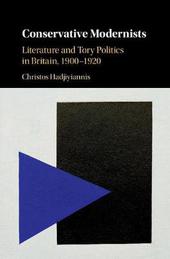
|
Conservative Modernists: Literature and Tory Politics in Britain, 1900-1920
Hardback
Main Details
Description
Despite sustained scholarly interest in the politics of modernism, astonishingly little attention has been paid to its relationship to Conservatism. Yet modernist writing was imbricated with Tory rhetoric and ideology from when it emerged in the Edwardian era. By investigating the many intersections between Anglophone modernism and Tory politics, Conservative Modernists offers new ways to read major figures such as T. S. Eliot, Ezra Pound, T. E. Hulme, and Ford Madox Ford. It also highlights the contribution to modernism of lesser-known writers, including Edward Storer, J. M. Kennedy, and A. M. Ludovici. These are the figures to whom it most frequently returns, but, cutting through disciplinary delineations, the book simultaneously reveals the inputs to modernism of a broad range of political writers, philosophers, art historians, and crowd psychologists: from Pascal, Burke, and Disraeli, to Nietzsche, Le Bon, Wallas, Worringer, Ribot, Bergson, and Scheler.
Author Biography
Christos Hadjiyiannis is currently a Research Fellow in English Literature at Wolfson College, University of Oxford. He has published widely on modernism, including essays on T. E. Hulme and Edward Storer; Ezra Pound; J. M. Kennedy; Imagism; the avant-garde; and affect theory, phenomenology, and the literature of the First World War. He has written various encyclopedia entries and reviews non-fiction books regularly.
|